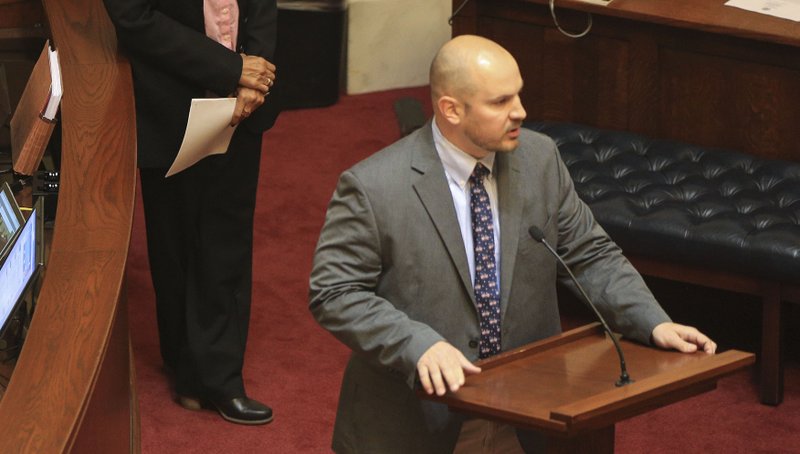Lawmakers on Wednesday questioned state officials about delayed payments to health care providers and disruptions in care stemming from the shift on March 1 to managed care for about 40,000 Medicaid recipients with significant mental illness or developmental disabilities.
Sen. Trent Garner, R-El Dorado, drew applause from providers who filled a meeting room at the Multi-Agency Complex near the state Capitol as he asked Department of Human Services officials whether a special session of the Legislature should be called to scrap the managed care system altogether.
"When should we come back to you and say, OK, enough's enough?" Garner asked.
Department Director Cindy Gillespie responded that the department and managed care companies are working to address the complaints.
"We do not believe the program itself needs to be thrown out in any shape or form," she said.
The joint meeting of the House and Senate committees on state agencies and governmental affairs continued an inquiry lawmakers started earlier this month on providers' complaints of slow reimbursement from the Medicaid program and managed care companies.
Approved by the Legislature in 2017, the shift to managed care is designed to save the state money while generating revenue that can be used to reduce the number of adults and children with developmental disabilities who are on a waiting list for home- and community-based services, including help with daily living tasks.
As of February, about 4,600 Arkansans were receiving such services, and more than 3,100 others were on the waiting list.
In the first phase of the managed-care shift last year, four companies began coordinating the care of patients with significant mental illness or developmental disabilities in exchange for monthly payments of $173.33 per recipient.
Under the second phase, three of the companies in March began receiving larger payments, ranging from $998.86 to $12,671.62 per patient, in exchange for paying for all of the patients' care.
The fourth firm, Forevercare, dropped out after the Human Services Department rejected its request to delay the start of the second phase until July 1.
According to testimony at Wednesday's meeting, the care coordination payments from July of last year through February totaled $51 million.
The payments for the first two months of the program's second phase totaled $268 million, said Sen. Kim Hammer, R-Benton.
The federal government provides about 70 percent of the funds used for the payments. The state then recoups 2.5 percent of the total payment through its insurance premium tax.
State officials estimated last year that the tax would generate about $23.1 million a year.
Act 775 of 2017 requires at least half of the premium tax revenue to go toward reducing the number of people with developmental disabilities on the waiting list for services.
The law also requires the managed care companies, known as Provider-led Arkansas Shared Savings Entities, or PASSEs, to be at least 51 percent owned by health care providers and that they contract with service providers around the state.
Melissa Stone, director of the Human Services Department's Division of Developmental Disabilities, said after the meeting that some parents of children assigned to a PASSE have been concerned that none of the companies had signed a contract with Arkansas Children's Hospital and its affiliated clinics.
"That is causing a lot of this," she said.
The hospital signed on with one of the companies, Arkansas Total Care, on Wednesday and is close to reaching an agreement with the other two companies, she said.
According to the Human Services Department's website, a consent decree in a federal court case between the state and health care providers requires the PASSEs to pay primary care doctors at least Medicaid's reimbursement rate, even if the doctor is not in the PASSE's network.
She said it's possible that some doctors were "caught off guard" when their patients' coverage switched to a PASSE.
"We should have been more engaged in the outreach that was happening," she said.
Stephanie Smith, chief operating officer for Easter Seals Arkansas, which serves people with developmental disabilities, told lawmakers that some difficulties that providers have encountered in submitting bills to the managed care companies stem from differences in the systems used by the companies and the Medicaid program.
The managed care companies also didn't have a way for providers to easily submit claims from patients who are on Medicaid but also have private insurance.
In those cases, the private insurance plan is billed first, and Medicaid -- or the managed care company, in the case of recipients who are assigned to one of the companies -- pays what the private plan doesn't cover.
"I think we're moving forward, but it's going to take time," she said.
She said the Human Services Department could reduce further disruptions by changing its plan for the open enrollment period in May, when Medicaid recipients assigned to a PASSE will be able to change to one of the other companies.
Instead of allowing the change to happen in seven or eight days, she recommended delaying the effective date of any changes to July 1 to allow the providers and PASSEs more time to prepare.
Gillespie said she would consider making the change, but said she also needs to consider the wishes of the enrollee, who might want the change to take effect as soon as possible.
A Section on 04/25/2019

